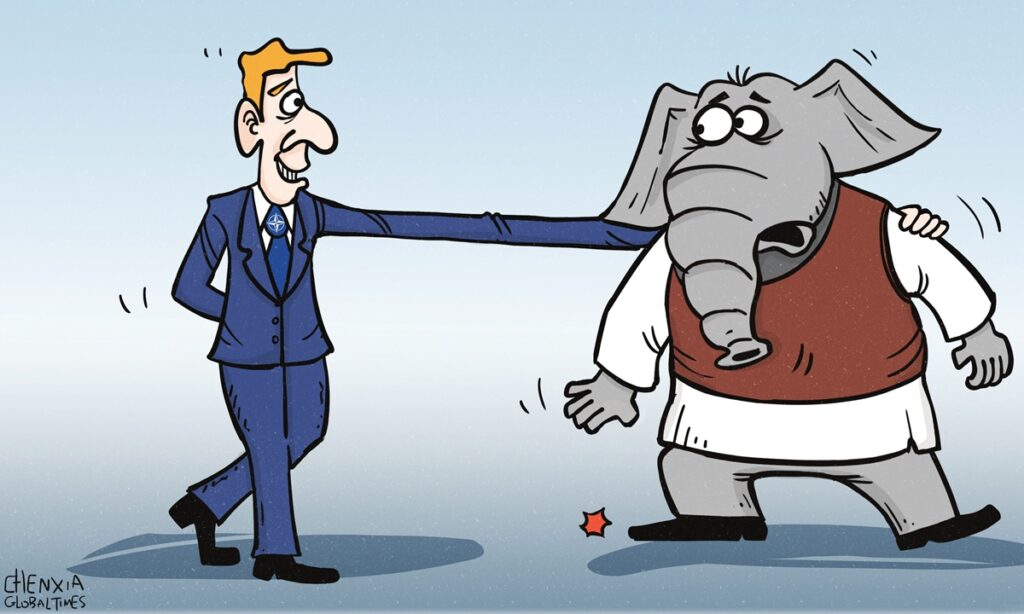For NATO desiring to extend its tentacles into the Asia-Pacific region and India eager to obtain a bigger say in regional affairs, an increased interaction may be a relatively reasonable stopgap for both. But if such cooperation goes further, New Delhi will have to encounter severe backlash from its people and face greater losses of diplomatic and strategic autonomy.
New Delhi is expected to host a “rare strategic dialogue” with the transatlantic alliance focusing on regional security issues in early March, the Indian newspaper Mint reported Friday, citing people aware of the matter. The talks are likely to include senior officials from NATO as well as officials from India’s defense and foreign ministries.
It makes sense logically, judging from the position of the two in the US’ strategic system. New Delhi has, over the years, tilted increasingly toward Washington in policies, slowly becoming a quasi-ally of the US. Thus, it is natural for New Delhi to strengthen its relations with NATO, an organization that is essentially one of Washington’s strategic tools to serve the US’ global strategy, including its Indo-Pacific Strategy.
Moreover, India and NATO have claimed it felt the so-called pressure and even “threats” from China’s growth. NATO declared China as one of its security challenges for the first time in its 2022 Strategic Concept. New Delhi also has had some conflicts with Beijing in recent years, especially over border issues, trade disputes and regional leadership.
As a result, containing China has become the biggest consensus and common interests between India and NATO, and their cooperation is anticipated to focus on joining forces against China.
Apart from the China factor, the enhanced interaction between the two is also an effort for one side to exploit the other for its own strategic benefit. Each side can take what it needs from the cooperation.
NATO is facing tremendous pressure in the ongoing Russia-Ukraine conflict, especially under Moscow’s recent heavy offensive. Feeling that it might not be as strong as it has thought, the organization is seeking external assistance or moral support.
Besides, NATO still has the evil intention of expanding its engagement with the Asia-Pacific region, which will certainly disrupt regional order. It hopes to use India as a springboard to deepen its involvement in the region, thereby strengthening its containment of China and pinning Russia down from the west and the east sides.
As for India, it wants to improve the complex global strategic environment in which it currently finds itself. Especially since the outbreak of the Russia-Ukraine conflict, the West has tried to draw India into sanctions against Russia, while India has tried to maintain a neutral position as it is still in great need of Russia.
Lan Jianxue, director and associate research fellow at the Department for Asia-Pacific Studies, China Institute of International Studies, told the Global Times that by interacting more with NATO, India also intends to exert some influence in easing the tension between Russia and the transatlantic treaty organization. He noted that this is a way for New Delhi to highlight its so-called great power status and create a favorable condition to host this year’s G20 summit.
However, India sticking too tightly to NATO is playing with fire. If India’s interaction with the organization is too close, the South Asian country may face backlash from public opinion at home. Many Indians don’t have a favorable view of NATO, and some Indian media outlets have also urged the Indian government to “keep ties with NATO limited” and not become too integrated into the Washington-led alliance system. Therefore, if New Delhi insists on strengthening cooperation with NATO, it has to take into account its domestic public opinion seriously.
On top of that, it will also be a test of India’s diplomatic and strategic autonomy, which is declining significantly due to it increasingly tying itself to US strategy. It has demonstrated that India may not have the capacity and resources to assert its strategic autonomy as it has proclaimed. It should be said that following Washington to this degree has already dealt a major blow to New Delhi’s strategic autonomy.
Whether India is more able to pursue an independent foreign policy rather than following the US will be crucial for New Delhi.
“The cooperation with NATO could mean that India will have to sacrifice its own interests. And if India becomes subordinate to NATO in the end, it would go contrary to India’s goal of acting as a power with independence and self-determination,” said Chinese military expert and TV commentator Song Zhongping.
(Global Times)




